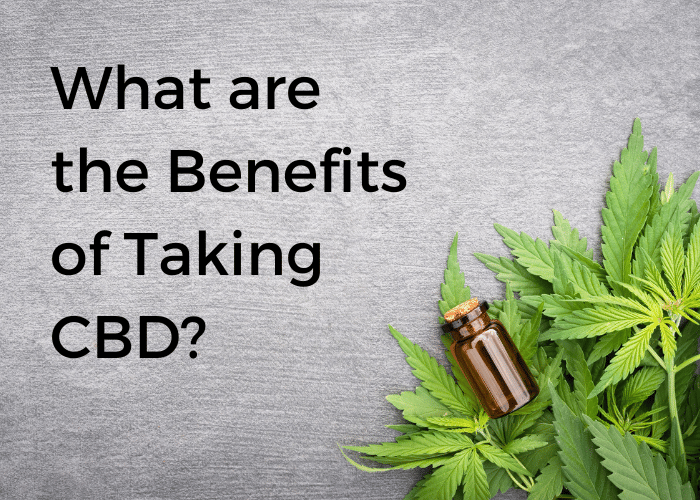The Benefits of Taking CBD

What are the Benefits of Taking CBD?
Today, more and more people are looking for adjuncts or alternatives to taking over the counter (OTC) and prescription medicines. The growth in popularity of CBD based products over the past several years is proof there is a demand for natural solutions that can address symptoms like lack of sleep, anxiety or pain etc… CBD, or cannabidiol, is the most abundant cannabinoid in the cannabis plant, and unlike its cousin, THC, or tetrahydrocannabinol, CBD will not get you “high.”

Many people at this juncture might say, “so why would anyone want to try CBD?” The answer is because of the many potential health benefits that have become associated with ingesting CBD in some for factor just like a vitamin supplement. So what are the benefits of taking CBD?
To understand that, we need to start with the Endocannabinoid System (ECS.) All mammals, anything with a vertebrate, share a network of receptors that lay on the surface of cells throughout our body. These receptors are known as cannabinoid 1 (CB1) and cannabinoid 2 (CB2) receptors. Over the past few decades, our understanding of the ECS has grown through medical, pre-clinical and observational studies.
Though more research, studies and clinical trials are needed, what we know now is that the ECS is the master conductor in controlling homeostasis in the body because it sends messages to all organ systems, and each organ system plays certain roles in working together to maintain the equilibrium our bodies require to perform regular daily functions.
The ECS also interacts with your central nervous system (CNS,) glands and hormone production via the endocrine system, and several other chemical and physiological aspects in the body. Besides regulating organ systems and communication throughout the body, the ECS regulates mood, sleep, appetite, sex drive, cognition, pain perception, digestion, energy production, stress response etc…
When a person ingests CBD and it gets into the bloodstream, it interacts with the CB1 and CB2 receptors throughout the body by delivering messages in the form of neurotransmitters that contain instructions for how the body needs to regulate to stay in balance against internal and external (environmental) stimuli.
CBD and the other compounds in cannabis are what spinach is to Popeye, they are nourishment for our bodies! And while there needs to be a lot more research and medical studies done on the cannabis plant and its various compounds, CBD has been indicated in being beneficial for more symptoms than I have the capacity to write about, but let’s highlight some of the most popular uses for CBD.
As an anti-inflammatory, many medical studies suggest that CBD has been shown to be more effective at reducing inflammation than over the counter (OTC) or prescription pain medications, including creams and patches. Even better, CBD has not been linked to any serious side effects or adverse reactions, so its safety profile is very reassuring.
Also, unlike a lot of pain medications out there, CBD is not habit forming or addictive, making it a fantastic option for people who suffer from chronic pain symptoms. By regulating the various inflammatory pathways in the body, CBD is poised to become a mainstay in people’s medicine cabinet.
CBD has also been studied for its relaxing and “chill” properties, which has been indicated in addressing various symptoms of anxiety. It is estimated that 19.1% of Americans have suffered from anxiety in the past year. While many people reach for a glass of wine or a beer to help them de-stress, more people are reaching for a bottle of CBD oil or CBD gummies to unwind after a stressful day.
CBD interacts with CB1 and CB2 receptors in our Central Nervous System (CNS) and within our sympathetic and parasympathetic nervous systems to help us control our response to stress without psychoactive effects, so your cognition is not impacted or impaired.
Another popular use for CBD is to assist people who have trouble falling or staying asleep and studies suggest that a combination of CBD and other cannabinoids, especially CBN (Cannabinol) may cause sedation and relaxation so that people can drift into a more peaceful night’s sleep.
Stress, diet and a host of other variables can impact a person’s sleep cycle and when a person’s circadian rhythm is disrupted, any current symptoms or conditions are magnified. This is why there has been a proliferation of hemp-derived products like CBD oils and gummies that are specifically focused on sleep.
As previously mentioned, there are several other health related benefits associated with taking CBD oil in one form or another, and science and medical studies are only beginning to understand the many potential uses of cannabis sativa L (hemp and marijuana.) As advocacy for cannabis grows, we will see more exciting and innovative uses and applications for CBD and other cannabinoids.

